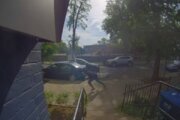When Abhishek Shakya traveled more than 8,000 miles from Nepal to Oklahoma in search of adventure and an affordable education, he did not expect to end up nine years later as an epidemiologist at the Tulsa Health Department during a raging pandemic, working seven days a week trying to discern the infection and symptom patterns of COVID-19.
“Initially we were only looking for certain symptoms, like a fever of 100.4, or losing the sense of taste or smell,” says Shakya, 27, who has been in his current position since March 2019. “But there are cases where people only had a sore throat. We didn’t ask about diarrhea at all at first, but it turns out many people have it for three or four days. The list of symptoms gets longer and longer, and there hasn’t been a pattern that I’ve observed.”
Tulsa has been a hot spot for the disease recently, though Shakya says it’s difficult to trace the outbreak to one source, such as President Trump’s campaign rally there in June. At this writing, Tulsa County has recorded more than 8,600 confirmed cases, though thankfully the pace of new cases has slowed, and with the hiring of additional personnel at the department, Shakya is no longer working weekends to keep up.
[See: Dr. Anthony Fauci: Fighting the Coronavirus Pandemic ‘Is My Entire World.’]
Shakya had yearned to try life outside Nepal. He knew he wanted to go to the U.S., and friends suggested that he head to Oklahoma because of its relatively low education costs and availability of scholarship money. He earned a degree in environmental health science at East Central University in Ada, Oklahoma, where he met his wife, also from Nepal. After graduating in 2015, he took a position in the Tulsa Health Department as a food safety inspector, investigating outbreaks of foodborne illness. He also joined the U.S. Army Reserve, which both satisfied his longstanding desire to serve in the military and is helping him with education costs as he works on a master’s degree in public health, remotely, through Purdue University Global in Chicago. And he became an American citizen.
Shakya jumped at an opportunity to move into an epidemiologist role, which at the time involved tracking more routine diseases like measles and tick-borne illnesses. (“Those are still happening,” he says. “We have to juggle between the two.”) He and his team of interviewers call people who have had positive COVID-19 tests or a COVID-19 diagnosis, to get a picture of how the disease is spreading and affecting the health of Tulsans. How did they get exposed — and when? What symptoms did they have to begin with? What’s the course of their disease? Who have they been in contact with? (They pass that information to the health department’s contact tracers, who alert exposed people to quarantine themselves and get tested.)
Between the original patients and members of their households who may have tested positive for the virus or be exhibiting symptoms, Shakya has been known to interview up to 17 people in a single day, and he also needs to be available for questions from his team. The health department offers tests to people who have been exposed but are not showing symptoms, and Shakya educates his interviewees about staying isolated if they might be infectious.
[Read: Dr. Sanjay Gupta — Holding America’s Hand Through the Pandemic.]
Shakya tries to leave his job entirely behind in his off hours. Cooking and gardening help. Surfing Netflix is a frequent choice (“but no documentaries,” he says). He also has to keep up with his graduate school coursework. He expects to finish up next spring and will continue working in epidemiology. His wife is employed by a bank. Neither have had COVID-19, and their families and friends, both in Nepal and in the U.S., have been largely unaffected as well. Nepal has controlled the pandemic effectively so far with lockdowns and masking, Shakya says. At this writing, there were 49 COVID-19 deaths reported for the entire country of 29 million people, compared with the 92 recorded in Tulsa County, home to more than 650,000 residents.
When friends ask him what they should be doing to fight the virus, Shakya’s message is consistent: “Put on your mask. If you’re sick, stay home. If you need testing, get it done.”
And answer the phone when he calls. “When the health department calls you, it’s to see if we can find the other exposures and stop the spreading. That’s why we are telling you and your family to isolate.”
More from U.S. News
Fear, Courage, Grit: Meet More Than 50 ‘Hospital Heroes’ in Pictures
A Look at Hospitals, Health Care Workers Fighting the Coronavirus Pandemic
Nurses Treating Coronavirus Patients Self-Isolate To Protect Their Families
27-Year-Old Epidemiologist in Tulsa Is Now a COVID-19 Detective originally appeared on usnews.com







